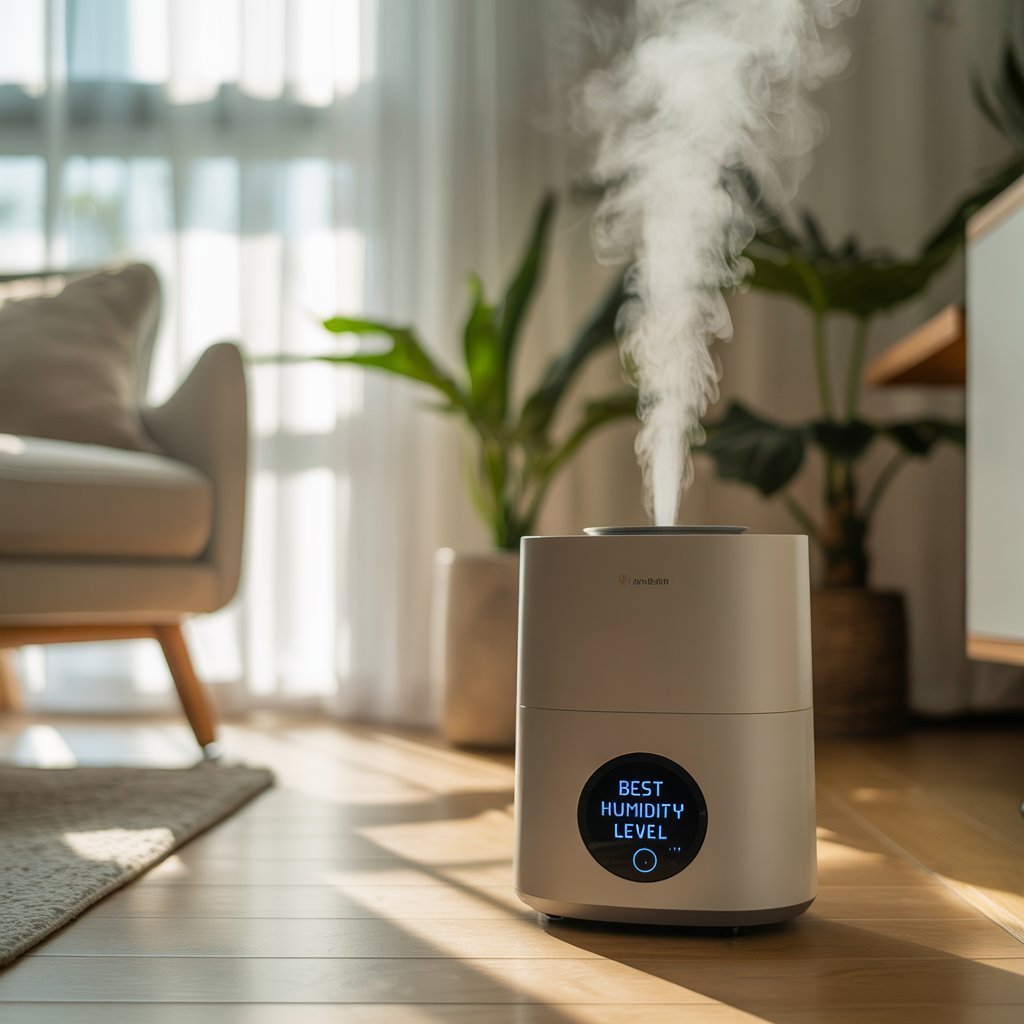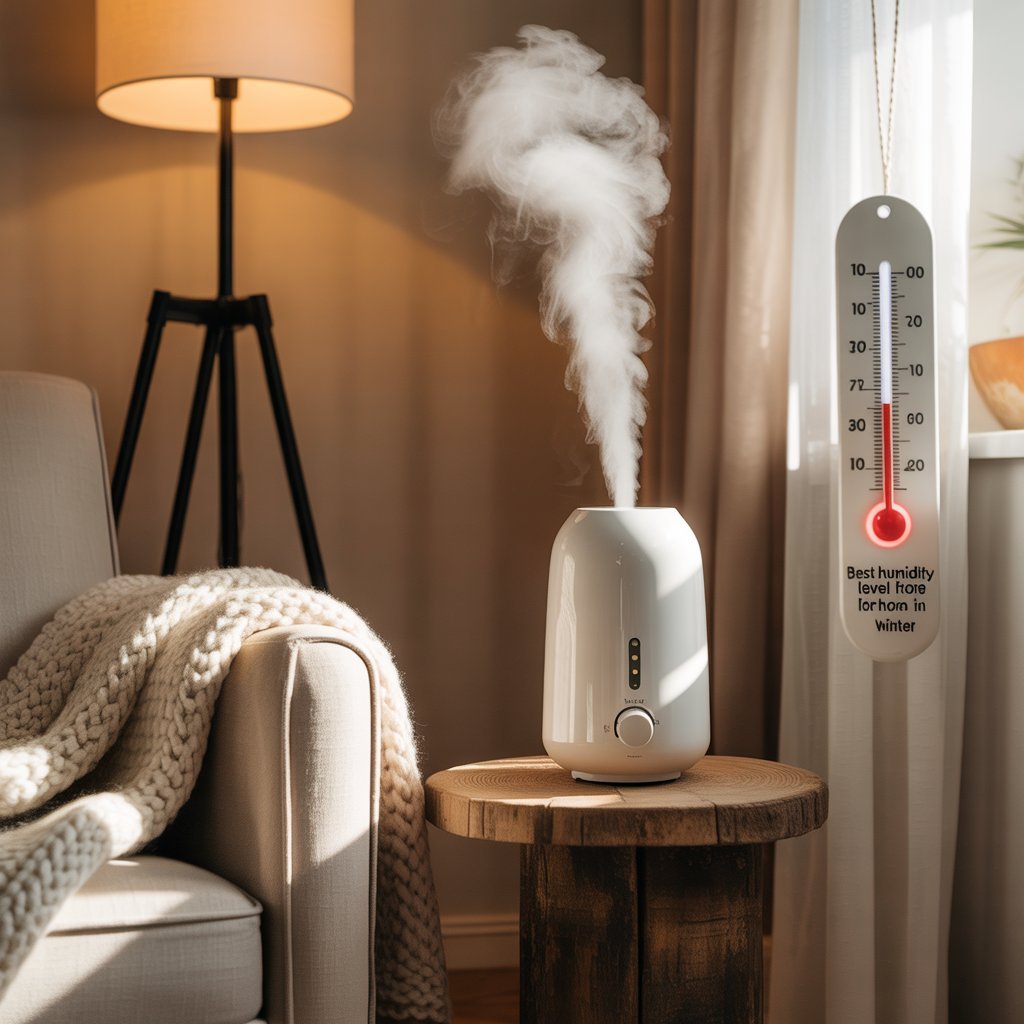Best Humidity Level for Home in Winter is just as essential as keeping your home warm when the temperatures drop. Cold winter air naturally holds less moisture, which can quickly dry out your indoor environment and cause discomfort, health concerns, and even structural damage to your home. Experts generally recommend maintaining indoor humidity between 30% and 50%, though the exact percentage can vary depending on your local climate, heating methods, and home insulation.

If your air is too dry, you may start noticing static shocks, dry or itchy skin, irritated sinuses, or even cracked wooden furniture. On the flip side, too much humidity during the colder months can create condensation on windows, encourage mold growth, and damage walls or ceilings. Striking the right balance is the key to ensuring both comfort and long term protection for your home. In this article, we’ll dive into what leading experts suggest as the ideal humidity level, explore the top five authoritative sources on Google, and highlight real-world discussions from Reddit where homeowners share their personal experiences on managing indoor humidity during the winter season.
What Is the Best Humidity Level for Homes in Winter?
According to experts at Mayo Clinic, Energy Star, and other trusted health and home organizations, the best indoor humidity level in winter is between 30% and 50%. However, many recommend keeping it slightly lower around 30% to 40% to prevent condensation on cold windows.
The logic is simple: while higher humidity feels more comfortable, it increases the risk of moisture damage in colder months. Reddit homeowners in colder climates like Minnesota and Canada often share that going above 40% quickly leads to fogged windows and even ice buildup. So, while the sweet spot is officially broad, in practice, 35% to 40% tends to be the most manageable range for comfort and safety.
Why Is Low Humidity a Problem in Winter?
Low humidity is one of the biggest challenges of winter living. When heating systems run continuously, they strip moisture from the air, leaving it extremely dry. This can cause dry throat, itchy eyes, cracked lips, and worsen conditions like eczema. Low humidity also increases susceptibility to colds and flu because dry nasal passages make it easier for viruses to enter the body.
According to WebMD, dry air can also trigger asthma and allergy symptoms. Beyond health, dry air damages your home by causing wooden floors to shrink, furniture to crack, and paint to peel. Reddit users often complain about static shocks in winter, which are a direct result of overly dry air. That’s why monitoring humidity with a hygrometer is essential to avoid these issues.
Can High Humidity Be Harmful in Winter?
While most winter problems come from dryness, having too much humidity indoors can also be harmful. Condensation on windows and walls creates the perfect environment for mold and mildew growth. According to Energy Star, excessive humidity can damage insulation, wood trim, and even electronics.
Redditors living in older homes say that once humidity rises above 45% in sub-freezing weather, condensation appears, and mold issues follow. High humidity can also make rooms feel colder, causing you to turn up the thermostat unnecessarily, leading to higher energy bills. So, while humidifiers are useful, setting them too high can backfire. Keeping humidity between 30% and 40% strikes the right balance comfortable for humans, but not for mold.
How Do You Measure Indoor Humidity Accurately?
Measuring humidity at home is simple with a hygrometer, a device available at most home improvement stores for under $20. Smart thermostats like Nest or Ecobee also have built-in humidity sensors, giving real-time readings. Experts from the CDC recommend placing the hygrometer in a central living space away from windows and vents for the most accurate readings.
On Reddit’s r/HomeImprovement, many users suggest buying two hygrometers and placing them in different rooms to check for inconsistencies, especially if your home has multiple floors. Consistent monitoring ensures you know when to adjust your humidifier or dehumidifier. Without proper measurement, it’s easy to overshoot and create an unhealthy environment.
What’s the Best Way to Increase Humidity in Winter?
The most common solution is using a humidifier. Portable units are affordable and can humidify single rooms, while whole house humidifiers attach to your furnace for broader coverage. Some homeowners on Reddit mention budget-friendly methods like placing bowls of water near heating vents or drying clothes indoors to naturally add moisture. Indoor plants also help maintain humidity levels.
The top sites recommend setting humidifiers with automatic controls that stop adding moisture once the target percentage is reached. This prevents over-humidification and saves energy. Regularly cleaning the unit is also essential, since humidifiers can spread bacteria if left unmaintained.
Should You Lower Humidity When It Gets Colder Outside?
Yes, outside temperature directly affects the safe indoor humidity level. For example, the Canadian Mortgage and Housing Corporation (CMHC) recommends reducing indoor humidity to around 25–30% when outdoor temperatures drop below -10°C (14°F) to prevent condensation.
Reddit users often mention adjusting settings daily depending on weather. If your windows are fogging or showing ice buildup, that’s a clear sign humidity is too high for current outdoor conditions. Some smart humidifiers and thermostats can automatically adjust based on outdoor weather data, making it easier to maintain the right balance without constant monitoring.
How Does Humidity Impact Energy Efficiency in Winter?
Proper humidity not only improves comfort but also helps you save money. According to Energy.gov, air with balanced humidity feels warmer, allowing you to keep your thermostat lower.
For instance, 40% humidity at 68°F feels much more comfortable than 20% humidity at the same temperature. Reddit discussions highlight how homes with balanced humidity often reduce heating costs by up to 10%. On the other hand, very high humidity makes the air feel cooler, leading homeowners to crank up the heat and waste energy. Thus, keeping humidity balanced improves both comfort and energy efficiency during winter months.
What Do Reddit Users Recommend for Managing Winter Humidity?
Reddit has extensive discussions on indoor air quality during winter. On r/HomeImprovement and r/AskReddit, users commonly agree that 35%–40% humidity works best in most North American homes. Many recommend whole-house humidifiers for consistency, while renters often rely on portable units in bedrooms.
Some Redditors warn against “set it and forget it” with humidifiers, since weather fluctuations require adjustments. Others share success with indoor plants, fish tanks, or even boiling water on the stove to temporarily raise humidity. Overall, the consensus aligns with expert advice: aim for moderate humidity and adjust as temperatures drop.
Conclusion
The best humidity level for homes in winter generally falls between 30% and 40%, with small adjustments based on your local climate and outdoor temperatures. Low humidity leads to discomfort, health issues, and damage to wooden structures, while high humidity encourages mold growth and condensation.
Tools like hygrometers, humidifiers, and smart thermostats make it easier to manage indoor air quality. Both expert advice and Reddit discussions confirm that striking the right balance is the key to comfort, health, and efficiency. If your windows are clear, your skin feels comfortable, and your heating bill stays reasonable, you’ve likely found the perfect winter humidity for your home.
FAQs
Q1. What is the ideal indoor humidity in winter?
Most experts recommend 30% to 40% for comfort and safety.
Q2. Can dry winter air make you sick?
Yes, dry air irritates your throat, nose, and skin, making you more vulnerable to colds and flu.
Q3. How do I know if my home is too humid in winter?
Look for condensation on windows, damp walls, or mold growth.
Q4. Are humidifiers safe to use all winter?
Yes, but clean them regularly to prevent bacteria or mold buildup.
Q5. What humidity level prevents static electricity in winter?
Keeping humidity at 35% or higher usually reduces static shocks.

